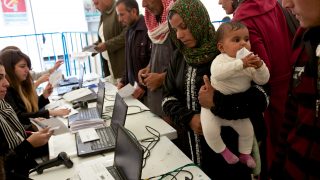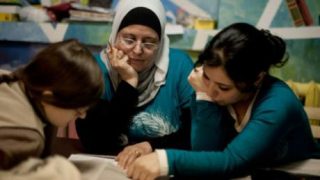“Our journey lasted five days, and I crawled home out of exhaustion.” This is how Ahmad al-Qassem, 29, sums up his return to his village, Ain Sheeb, in Idlib Governorate, northwestern Syria, fleeing the Israeli war on Lebanon, a country where he had lived for twelve years as a valet in the Salim Kallas in Beirut. Ahmad’s family of five had returned six months earlier, before he joined them in early October on a long journey that took him through the divided areas of Syria, passing through regions controlled by the Syrian regime, the autonomous administration, the interim government (the National Army), and the Salvation Government (Hayat Tahrir al-Sham).
With Ahmad, 4,000 people crossed the Dadat crossing, according to data from the interim government, of whom 3,033 reached Idlib, including 2,000 children. The first batch, arriving on 3 October, included 1,700 civilians, while the second batch, arriving between the 8 and 10 of the same month, consisted of 1,000 people. The rest entered sporadically, according to the Civil Defense.
Despite the issuance of a decision to open the Abu al-Zandin crossing—connecting the northern countryside of Aleppo with areas controlled by the Syrian government since 22 October, as stated by the Ministry of Defense in the "interim government"—the returnees headed to the Dadat crossing, controlled by the interim government, due to the difficulties travelers faced at the Dadat crossing.
The director of the interim government media office, Jalal Al-Talawi, indicated that families did not enter through the Abu Al-Zandin crossing, despite the fact that “the crossing is permanently open and ready to receive families in terms of preparing the population to issue a temporary civil status release paper to facilitate movement, with complete equipment including ready reception tents and equipped transport vehicles as well.” However, people at that stage preferred to cross through the Dadat crossing out of fear that the Abu Al-Zandin crossing was not fully ready.
A Difficult Crossing to the "Homeland"
After fleeing the war in Lebanon and passing through areas controlled by the Syrian regime, the returnees underwent routine inspections in the Autonomous Administration territories. However, the most challenging stage was crossing the Aoun Al-Dadat checkpoint.
"We had some belongings with us. The office that arranged our journey asked us to leave them there and said we’d receive them after arriving, so we did," says 50-years-old Samir Al-Omar, from the village of Al-Mastouma in the western Idlib countryside, which is under the control of the "Salvation Government." Speaking to Syria Untold about his return trip from Lebanon to Idlib, he explained: "Most of the belongings arrived, but some small items didn’t, like mobile phones."
Samir and his family spent two freezing nights at the Aoun Al-Dadat crossing without mattresses or shelter. "We had children with us—my ten-year-old son and three of my friend's children—and we didn’t have blankets. We took off our coats to cover them, lit a fire to keep warm, and stayed awake for two nights," says Samir.
Fleeing the War in Lebanon... Returning to the Syrian Coast
18 November 2024
As for Moeina Fallah, from the town of Binnish in the Idlib countryside, who crossed with the first batch, she told Syria Untold, “My daughters couldn’t find a place to relieve themselves,” and added, “Some people were paying bribes to speed up the procedures. But we held a demonstration, and our group crossed without paying anything.”
Samir Al-Omar also described the unsettling chaos they experienced, as no one provided them with any information about their accommodation details. “There was no one to talk to us or guide us at the Aoun Al-Dadat crossing. When I asked the driver where we were, he simply said, ‘You will arrive in two hours to the place you want,’ without offering any further details. I just wanted to reassure my family and relatives.”
Samir no longer recognized the streets and roundabouts of Syria after being away for 14 consecutive years. With half-closed eyes, he tried to recall the details of his journey. “I do not remember any area we passed through except for the Tal al-Hawa crossing near Jarablus, in the Aleppo countryside, which is controlled by the ‘National Army.’” The checkpoint at Tal al-Hawa issues a civil status document to facilitate movement in the area after crossing Aoun al-Dadat.
All that Al-Omar remembers is that there were no “annoying checkpoints.” Instead, the journey continued routinely until they finally reached their cities and villages.
Bribes at Military Checkpoints to Avoid “Military Service”
Since Samir and his family crossed the Lebanese border, he began to worry. “I am over the age of compulsory military service,” he explains. “But because of my brother, who is wanted for reserve duty, I was very afraid. When they told me that the regime’s checkpoints were over and we had entered the Kurdish area, I breathed a sigh of relief.”
Samir Al-Omar paid $2,600 to the office for the return trip with his wife, four children, his brother, his brother’s wife, and his nephew, at a cost of $325 per person. “The road was difficult and scary,” he describes, “and I was afraid for all of them.”
Offices in Lebanon have emerged offering trips across the various areas of control, from Lebanon to Damascus, and from there to Aleppo and Idlib, passing through four areas of control and various military checkpoints.
'We paid $350 for each seat on the bus, but we still stood the entire way from Beirut to Homs,' Mrs. Moeina Fallaha says.
Samir also had to pay an additional amount to checkpoints in areas controlled by the Syrian government to allow his brother, who was wanted for reserve duty, to pass. Although he received a seven-day postponement of his assignment, Samir was still afraid of provoking any checkpoint or soldier. “I paid huge sums of money so they wouldn’t take him—1,500,000 Syrian pounds at three checkpoints, 500,00 Syrian pounds for each checkpoint,” adding that he also gave small amounts to the checkpoint soldiers. “When they asked my brother to get out, he would give them money so they wouldn’t make him get out. It was a terrifying situation.”
Ahmad al-Qassem, 29 years old, was also afraid of being taken to serve reserve duty at the Syrian border, but he, too, received a postponement of his assignment. “There are so many checkpoints, 40 to 50,” he recalled during his conversation with Syria Untold.
Ahmad’s journey included 95 people, distributed over two buses, each carrying 47 passengers.
Here and There... The Departed and Those Remaining
03 May 2024
Mrs. Moeina Fallaha returned with her husband and children at the beginning of the Israeli war on Lebanon. “We paid $350 for each seat on the bus, but we still stood the entire way from Beirut to Homs.”
Moeina’s family left immediately after the neighborhood where they lived was bombed. “The situation was tragic. We didn’t take anything with us, except for some food to eat on the road, which some checkpoints took.”
Lebanon... War, Fear, and Then Escape
Moeina traveled with her husband and four children to Lebanon in 2012, while their town of Binnish was being heavily shelled due to the proximity of their home to the Shiite-majority village of Al-Foua, controlled by the Syrian regime, which was besieged on all four sides by opposition factions. The siege of the village ended in 2018 under the Four Towns Agreement, and its residents were deported to Damascus in exchange for the deportation of the people of Zabadani and Madaya to northwestern Syria.
Moeina's family faced financial hardship in Lebanon and struggled to find a place to live. "We lived in the Palestine camp located in the southern suburbs of Beirut. Our house was very small, like a tent, and my children worked to provide a livelihood for us," says Moeina.
When the Israeli war on Lebanon began, their neighborhood was bombed. “The bombing was far away at first,” she explains. “But later a missile fell just 200 meters from our house... My children were very scared.”
Moeina and her children hesitated greatly before making the decision to leave, especially after having settled in Lebanon for 12 years. Her children worked in a public market in Beirut, and they feared they would not find job opportunities in northern Syria. “I was afraid that our only source of income would be cut off,” she says. “There was a new life waiting for us that we knew nothing about.”
As for Samir and his family, they were living in the city of Tyre in southern Lebanon and were forced to leave despite initially insisting on staying. “We left like everyone else. We were the only ones remaining in the village,” he says, noting that his wife and children were extremely scared when they heard the sounds of nearby bombing. “As soon as we arrived in Beirut, they were relieved and breathed a sigh of relief,” he adds.
'When the shelling intensified, I thought about leaving immediately. After the death of Hassan Nasrallah (Secretary-General of Hezbollah), a terrifying racist discourse spread. I saw four members of the party shooting at people randomly, while they were shouting loudly,' Ahmad al-Qassem explains.
Although the area where Ahmad al-Qassem lived was not directly shelled in a way that would endanger his life, he could clearly hear the sounds of the bombardment. However, due to the prevailing circumstances, he was unable to sell any of his belongings, leaving his house as it was and taking only some clothes with him. “When the shelling intensified, I thought about leaving immediately. After the death of Hassan Nasrallah (Secretary-General of Hezbollah), a terrifying racist discourse spread. I saw four members of the party shooting at people randomly, while they were shouting loudly,” he recalls.
Re-establishing stability in a homeland whose features have changed
Residents of areas witnessing a wave of return express understanding for their fellow Syrians’ decision to return, according to observations made by the authors of this report. Ibrahim Al-Zeer, 40 years old, a merchant from the city of Idlib, says, “We lived through the war, and we know very well what the horrors of bombing mean; it’s part of our reality.” He notes that the Lebanese host a large number of Syrians, especially from Homs, Damascus, Daraa, and others who fled with their lives from Idlib due to Russian and Iranian-backed attacks supporting the Syrian regime forces.
Ibrahim believes that it is natural for Syrians to return to their cities and villages, and he sees no issue with hosting Lebanese as well. "After all, they are family and relatives," adding that this applies to everyone who did not participate in the war against Syrians and did not cause harm. He pointed out that most of the returnees have homes or relatives in their area, including some of his own family members. The returnees speak about how the area’s features have changed almost completely compared to the situation when they left Syria. Moeina Fallaha believes the changes have been for the better, in many ways, including reconstruction and the relative cessation of shelling. Ahmad Al-Qassem confirms that he has no intention of returning to Lebanon at all and believes the area has completely transformed. "My family and all my people are here. I will not return even if the war in Lebanon ends. I will settle in my country, I’ve had enough of being away from home."
Samir, for his part, also has no intention of returning to Lebanon after spending 13 years away from his home. "When I left my house in Mastouma in the Idlib countryside, a displaced family moved in," he explains. Samir currently lives in his sister's home in Jabal al-Zawiya. "I'm waiting for the residents of my house to sort out their situation so I can return to my home," Samir says, emphasizing that his return to Lebanon is "absolutely impossible."
Moeina and her children also affirm that they had no choice but to return to their city, as she does not see herself able to live in Syria under Assad’s rule. However, they are uncertain about what the future may hold for them, and she seems confident that “God does not forget anyone.”









